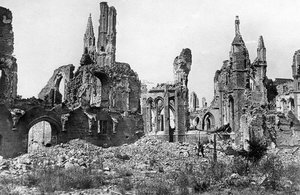Passchendaele descendants to commemorate ancestors at the Front
Special events in July will mark 100 years since the Battle of Passchendaele began, as we continue to commemorate the First World War centenary

Ypres Cathedral
More than 4000 people from across the UK will follow their ancestors’ journey to the Western Front this summer for special ceremonies marking 100 years since the Battle of Passchendaele.
It comes after a nationwide search and public ballot, launched by UK Culture Secretary Karen Bradley in January, for descendants with a family connection to the troops who served in the First World War on the Ypres Salient.
Of these, 200 people will be part of a Last Post ceremony under the Commonwealth War Graves Commission (CWGC) Menin Gate, the memorial to the missing in Ypres, Belgium, that bears their relative’s names.
As well as those who were selected in the public ballot, more descendants and visitors will join the commemorations on the eve of the centenary in Ypres’ historic Market Square on 30 July 2017.
There will be an evening of live musical performance with archive footage and photographs projected onto Cloth Hall to tell the story of the Third Battle of Ypres, commonly known as Passchendaele, which caused an estimated 250,000 British and Commonwealth casualties.
With no living veterans of the First World War, their children, grandchildren and great-grandchildren stand at the heart of the government’s official commemorations. Descendants have been invited to share their ancestor’s stories with the wider public online, including in a series of videos, the first of which has been released.
Culture Secretary Karen Bradley said:
As we continue to commemorate the centenary of the First World War, it is important that we remember the horrors of the battlefields of Ypres and honour the many who lost their lives. It is the descendants of those who experienced Passchendaele who can help tell its story and it is hugely symbolic for them to be able stand on Belgian soil to remember their relatives’ service and sacrifice.
We also want people in villages, towns and cities across Britain to join in commemorating Passchendaele on 31 July. The battle affected families and communities all over the country and is a significant part of our four-year programme of events marking the First World War’s centenary.
The commemorations will start with a traditional Last Post Ceremony at the CWGC Menin Gate in Ypres on the eve of the centenary, 30 July 2017. The Gate bears the names of 55,000 British and Commonwealth soldiers killed on the Ypres salient whose bodies were either not recovered or identified.
On 31 July 2017, to mark the centenary of the Third Battle of Ypres, the focus will shift to an official ceremony at the CWGC Tyne Cot cemetery.
Located at Zonnebeke, seven miles outside Ypres, Tyne Cot is the largest burial ground for Commonwealth forces in the world, where 12,000 soldiers are interred and a memorial wall holds the names of 35,000 soldiers who have no known grave.
On 30 and 31 July the nearby Memorial Park Passchendaele will host a visitor experience focusing on what life was like both on and behind the frontlines with talks, film, musical performance, children’s poetry, battlefield artefacts including a howitzer and living history displays.
Conditions at Passchendaele were so horrific that they define our collective memory of the First World War. Bogged down by thick mud caused by heavy rain and bombardment, troops suffered heavy losses as they battled uphill to take the Passchendaele ridge. By 10 November 1917, the British eventually claimed a victory despite suffering huge losses for very little territorial gain.
The government is also encouraging families to share their Passchendaele story at www.livesofthefirstworldwar.org. For more information on the UK national commemorative events to mark the Centenary of Passchendaele visit www.passchendaele.org.
ENDS
For more information please contact Alex Hemming, DCMS press office: 020 7211 2210.
NOTES TO EDITORS:
The descendants who feature in the video in order of appearance:
Kathleen Forcer Kath’s grandfather, Benjamin Everret, fought with the 12th Durham Light Infantry and was fatally wounded in the Battle of Passchendaele having served in many other notable battles of the First World War. He kept a daily diary throughout his time in the army and was on leave for just 10 days of the three years he served. Kath has two grown up sons and lives with her husband near Plymouth in Dorset.
Bill Piggins Bill lives with his family in Surrey. Bill’s great uncle Captain Robert Parry Morris MC served at Passchendaele. Bill has painstakingly researched the history of his family’s involvement fighting in France and Belgium.
Malcolm Loveridge Malcolm’s father William fought in the First World War. William was of slight stature and this helped him survive by being able to get into small places and hide in the trenches when he was under attack. William fought alongside a soldier called Ernest Gardner in the Rifle Brigade but Ernest sadly died. When William returned home he called on the family of Ernest, there he met his sister, Gwendolyn and they went onto marry. Malcolm lives with his wife Susan in Warwickshire.
Mary Tweed Mary’s grandfather, Col. the Rev. James Ogden Coop, was a vicar from Liverpool and served as an Army Chaplain to the 55th Division. He was present at the Battles of Somme and Passchendaele. He was awarded the DSO for his service during the Third Battle of Ypres and was twice mentioned in despatches. He survived and was later made Chaplain to the King, the first Army Chaplain to be given this role. He later died after the war from the effects of mustard gas but before doing so wrote two books including ‘A Short Guide to the Battlefields (March 1920)’; for the relatives of soldiers journeying to Belgium after the War. Mary lives with her family near Newmarket.